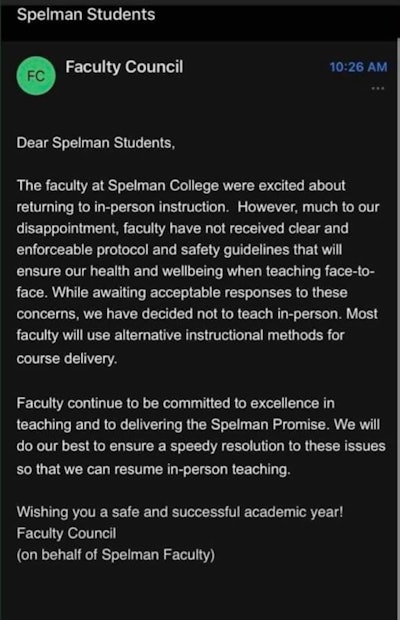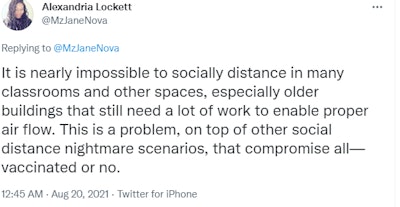 Screen capture of the email sent out from Spelman's Faculty Council.
Screen capture of the email sent out from Spelman's Faculty Council.
The in-person fall semester at Spelman College was set to begin on August 18, but an email recently sent to students from the faculty council at Spelman has triggered widespread confusion among students and their parents.
"Faculty have not received clear and enforceable protocol and safety guidelines that will ensure our health and wellbeing when teaching face-to-face," the email read. "While awaiting acceptable responses to these concerns, we have decided not to teach in-person."
For many students, it was the first that they were made aware that at least some of their classes would be online.
On Aug. 19, Spelman's president Dr. Mary Schmidt Campbell sent out an email to students informing them that the campus community that the college was indeed open “for in-person learning and instruction," and that "Spelman faculty members have decided to return to in-person teaching effective Monday, Aug. 23.”
This kind of back and forth, the tug of war between faculty and administrators, is something “we are likely to see across the landscape of higher education institutions,” said Dr. Shaun R. Harper, the Provost Professor of Education and Business at the University of Southern California (USC).
“Because of the evolving nature of the ongoing pandemic, the Delta variant, and inevitable future variants, they’ll continue to be disruptive and anxiety producing for faculty and students across institutions,” Harper said.
But due to the unique nature of historically Black colleges and universities (HBCUs) being underfunded, there may be less access to the technologies that can adequately address the heightened sense of anxiety on campuses.
Spelman is one of four Atlanta area HBCUs that make up the Atlanta University Center Consortium. All four schools have mandated vaccinations on their campuses, with exemptions only offered for medical or religious reasons. Proof of vaccination is uploaded to a database. So far, about 98% of the Spelman student population have been vaccinated, according to college officials.
Masks are required indoors and outdoors while on campus. All vaccinated students, faculty, and staff must be tested for COVID-19 every six weeks, and unvaccinated persons must be tested weekly. Anyone who spends time on campus must complete a daily self-assessment, checking for fever and other symptoms. But Spelman does not yet have a system in place to track self-assessment.
In a series of tweets, Dr. Alexandria Lockett, an assistant professor of English, stressed that Spelman faculty are not on strike, adding that they continue to work and remain flexible. Screen capture of tweet from Dr. Alexandria Locket, an assistant professor at Spelman.
Screen capture of tweet from Dr. Alexandria Locket, an assistant professor at Spelman.
“Plainly put,” she wrote, “Spelman has made many smart decisions during the pandemic.”
Still, her tweets expressed faculty concerns.
“It is nearly impossible to socially distance in many classrooms and other spaces, especially older buildings that still need a lot of work to enable proper air flow. This is a problem, on top of other social distance nightmare scenarios, that compromise all—vaccinated or no.”
The issue becomes further complicated when addressing the child-care needs of faculty. There are a “vast number of southern primary schools going virtual,” wrote Lockett.
“Spelman College is committed to the value of a residential college experience for its student," administrators noted in a COVID-19 guide for faculty. "By instituting a layered-protection approach, we hope to repeat our experience of last Spring [sic] and keep an infection rate below 1%.”
At USC, where Harper is also the founder and director of the USC Race and Equity Center, all on-campus personnel and students are required to be vaccinated, like at Spelman. Those records are uploaded digitally to the school’s health center. They are also required to assess their own health every day before coming on campus, by using an app called Trojan Check.
While filling out the app daily, is “extremely annoying,” it pairs with a deep sense of comfort, said Harper.
At every entrance to the school, a USC employee checks to ensure those entering campus have filled out the required Trojan Check.
“Imagine how much that costs in terms of the human resources,” said Harper. “It’s not just spending the money but having all these people at these checkpoints.”
If Spelman had that kind of resource, he said, "their faculty would likely feel much more comfortable."
“It’s not their fault. It’s connected to the chronic underfunding of HBCUs," said Harper. "I’m sure they’d use these technologies if they could.”
Harper admitted that, if his campus did not have the resources it did to track student’s health and vaccination status, he likely would not be physically present on campus.
“I’m usually a trusting person, but I’m not playing around with COVID. I’m not going on the honor system,” he said.
Still, Dr. Mohammed Tesemma, an assistant professor of math at Spelman and a member of the faculty council, was in his classroom on Friday, along with “almost all” of his students, although "some did zoom in," he said.
Tesemma utilized the hybrid model of instruction offered to professors who have students attending virtually.
“I feel comfortable. We have air purifiers, sanitations stations, masks,” he said. “We just want to make sure if any COVID-related issues come up that we want to address them, and more or less, that has been addressed.”
Campbell, who announced her retirement next year after six years as president of the private school for Black women, said that administrators will continue to monitor the pandemic.
"The College continues to work with the faculty to provide additional guidance on health and safety protocols as rapidly changing circumstances around COVID-19 continue to develop."
Liann Herder can be reached at [email protected].



















